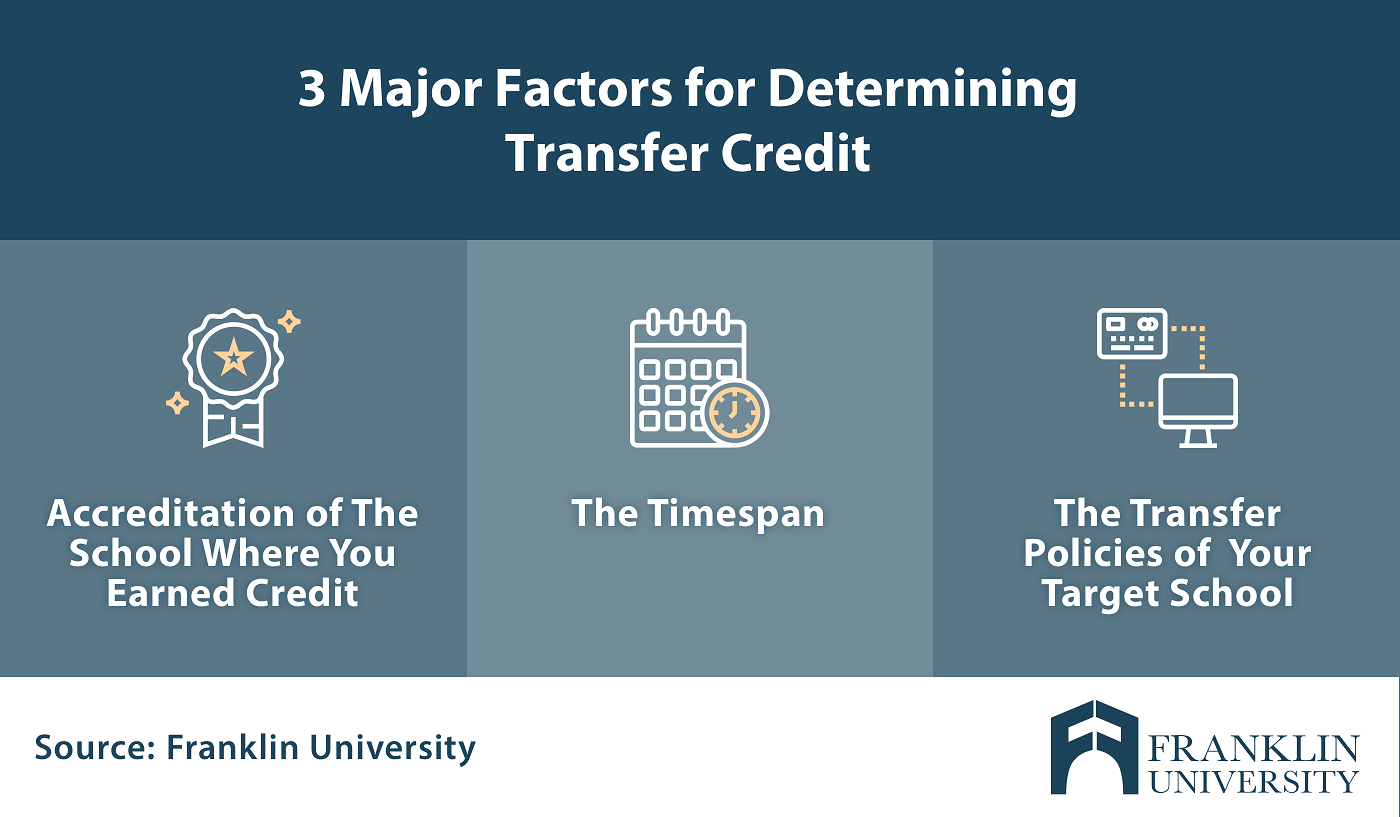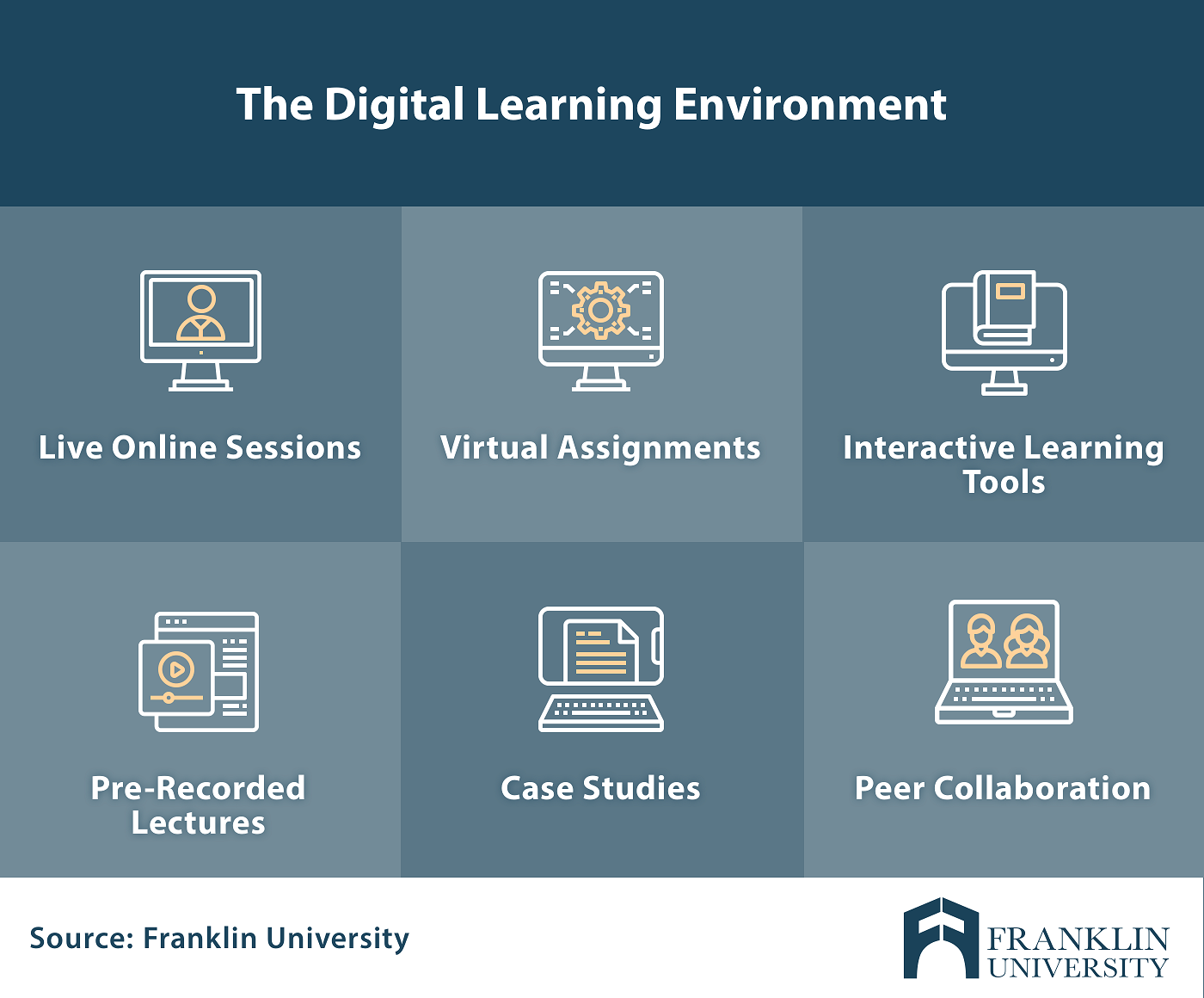Request Information
We're Sorry
There was an unexpected error with the form (your web browser was unable to retrieve some required data from our servers). This kind of error may occur if you have temporarily lost your internet connection. If you're able to verify that your internet connection is stable and the error persists, the Franklin University Help Desk is available to assist you at helpdesk@franklin.edu, 614.947.6682 (local), or 1.866.435.7006 (toll free).
Just a moment while we process your submission.

Finish My Degree Online: 5 Big Questions Answered
There are many students who earn college credit but don't earn a degree. In the United States, the overall dropout rate for undergraduate college students is 40%, with approximately 30% of college freshmen dropping out before their sophomore year (EducationData.org).
There are a multitude of reasons students leave college before completing their degree. For many students, the primary reason is financial, with changes in personal circumstances or lack of academic preparedness also highly contributing factors.
If you attended college but didn’t complete your degree, know that you’re not alone. You also aren’t alone in your ambitions to finish what you started. However, it can be overwhelming to figure out the best path to finishing your degree.
For many prospective returning students, online education opens the door to a feasible route to getting a degree. But can you complete your degree online? What will it take?
Here are the answers to some of your biggest questions.
Can I Finish My College Degree Online?
Absolutely. Finishing your degree online is a great way to earn your degree part-time while continuing to earn income and balancing your other priorities.
That’s why so many people with some college but no degree turn to online education. Most online programs are designed for degree completions, whether you started your degree at a traditional school or another online college.
- If you attended a traditional school, transitioning to an online program can give you more flexibility as you complete your degree. If you’re unfamiliar with online education, make sure you do your research into the credibility and quality of potential online colleges. Also, be sure to understand the type of online college you will attend. A student-centered online college, which is instructor-led and includes peer collaboration, will feel much more familiar than a competency-based program. Competency-based online courses are completely self-led and don’t adhere to a defined academic schedule, so it can be difficult to adjust and may fall short of your expectations.
- If you attended another online college, know that all online colleges are not the same. Whether you had a positive or negative experience previously, look for the attributes that will make you the most successful as a student. Be aware, some online colleges do not meet the same accreditation standards, which can hamper your ability to get transfer credit if you switch to a regionally-accredited online college.
Will All My Previous Work Be Wasted? Will I Have To Start Over?

It depends—transfer credit varies widely between colleges and universities. Three majors factors impact your ability to transfer credit:
- The college or university where you earned credits. The reputation and accreditation status of the college or university you attended greatly impacts your ability to transfer credit. The most easily transferable credit will be from regionally-accredited institutions—nearly all schools will accept this type of credit. Credits earned at nationally accredited institutions may not be accepted. While credits earned at regionally-accredited institutions help, how this credit transfers and applies to your degree is dependent on the individual school you choose.
- How long it’s been since you earned the credits. College credits can expire. For fast-changing fields, like technology, or highly-regulated industries, like accounting, the typical expiration time frame is between 5 to 10 years. However, this varies by school and is usually not advertised so you will have to do your due diligence with each online college you consider.
- The transfer credit friendliness of the online college where you want to complete your degree. Each online college has different rules on the number of transfer credits they will accept and how they will apply toward your degree. Credits don’t always transfer one-to-one. You need to be aware of how many credits will apply toward your degree program vs. counting to general education or elective courses.
When weighing your options of finishing your degree online, look for colleges that have generous transfer credit policies and will work with you one-on-one to ensure your previously earned credit is maximized.
What Determines How Long It Will Take Me To Finish My Degree Online?
It’s highly personal—many factors affect how long it will take to finish your degree.
A bachelor’s degree may be deemed a four-year program, but that doesn’t mean it’s guaranteed to be completed in that time frame. In fact, according to the National Center for Education Statistics, just 41% of first-time full-time college students earn a bachelor’s degree in four years, and only 59% earn a bachelor’s in six years.
When it comes to paying for school, grants are among your best options. But do you know how to find them? Remove the guesswork by downloading this free guide
If you’re returning to finish your degree online, you may be on a different time table as well. However, that doesn’t mean you’ve fallen behind.
Here are the major factors that will impact your time to degree completion:
- If you plan to change majors or areas of study it may require additional prerequisites and/or major courses that can increase the time to earn your degree.
- If you get transfer credits for your previous work, do they transfer toward major requirements or only general education and electives? More credit toward major requirements can speed up your time to completion.
- The number of credits you need to complete. A bachelor’s degree requires 120 credits to graduate. Look at how many credits you need to complete after your transfer credit is awarded and how many you can reasonably take in a year to estimate your timeframe.
- The scheduling flexibility of your online college, a well as your personal schedule and the time you can commit to earning your degree.
- Your financial situation and how much you are willing to finance or pay for your degree at one time.
If you’re looking to finish your degree faster, look for a transfer-friendly online college with a flexible academic schedule. For example, Franklin University is a highly transfer friendly institution and will accept up to 94 credits toward a bachelor’s degree or about 75% of the credits needed to graduate. Variable course lengths and multiple start dates also make it easier for you to schedule your online courses at Franklin.
What Will I Have To Do To Complete My Degree Online?
At the best online colleges, you will complete the same work required by a traditional college, but in an online format.

There’s no difference between a bachelor’s degree you earn on campus and the degree you earn online. It’s the same college degree, so don’t expect an online college to be less rigorous than an on-campus program.
However, online college courses can vary widely in learning experiences and methodologies. Student-centered online courses seamlessly transition the best aspects of traditional college online while maintaining maximum flexibility. On the other hand, competency-based programs are completely self-led and lack the interpersonal learning many students want.
Here’s what you can expect from a top-quality, student-centered online college course:
- Live, online meet sessions where you can learn from and collaborate with your instructor and peers.
- Interactive virtual assignments, including group projects and virtual presentations that help you learn through collaboration and first-hand experience.
- Multifaceted learning experiences, including videos, illustrations, gamification, interactive polls, quizzes and more.
- Industry-standard tools and technology integrated into each course for hands-on learning applied to real-world challenges.
- Case studies used to help translate theory into practical and professional knowledge.
- Recorded lectures and activities for students who can’t attend classes or for reviewing course content.
Where Should I Complete My Online Degree?
An online college that offers high-quality degrees that will support you in accomplishing your goals.
There are great online colleges and then there are online colleges that provide questionable value. Here’s a checklist to help you separate the best from the rest:
- Regionally accredited online college that meets the highest academic standards. Bonus if the degree program curriculum is also accredited.
- Maximum transfer credit for coursework you’ve already completed, especially in terms of meeting major requirements.
- Flexible scheduling and learning format that allows you to work around your schedule without extending your timeline.
- A balanced learning format, which spreads course content and assignments evenly across the entire length of the course so you know exactly how much time to dedicate each week.
- Mentors and professional networking opportunities that can help you advance your career.
Why You Should Complete Your Degree at Franklin University—A Student-Centered Online College
Franklin University is designed for the needs of busy, working adults. The average age of our students is 34 and 90% of our students transfer previously earned credit toward their degree. We work with you one-on-one to maximize your transfer credit, making it faster, easier and more affordable to finish your degree online. Franklin University offers high-quality degree programs, expert faculty and hands-on learning you need to successfully complete your degree.
Learn more about transferring to a bachelor’s degree program at Franklin University and our complete offering of online bachelor’s degrees.





